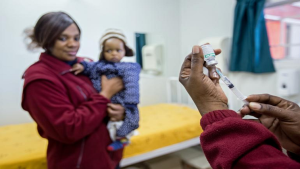Pressure is mounting on government to make teachers a priority when it provides COVID-19 vaccines to vulnerable groups.
The United Nations Children’s Agency (Unicef) has called on governments around the world to ensure that teachers are among the first to receive the vaccines.
It says since the coronavirus pandemic has wreaked havoc on children’s education around the globe, vaccinating teachers would be a critical step towards putting it back on track.
Chris Klopper is the Chief Executive of the South African Teachers Union Chris Klopper says government has been dragging its feet in obtaining the vaccine. “The government and especially the Department of Health, they are dilly dallying, just look what other countries are doing. The vaccinations are available. Go out and buy them and start with the programme. We are still contemplating what we must buy and how we’re going to roll that out. It doesn’t assist anyone. It comes back to the question when this will be done. We have wonderful policies, wonderful papers that we draft, but when it comes to execution, we are found lacking.
Criticism against rollout, time frames
Health Minister Dr Zweli Mkhize says government is pushing for a coronavirus vaccine rollout in South Africa by February.
Mkhize however also said that structures have been set up to expedite the rollout of the vaccine in South Africa.
Frontline healthcare workers and the most vulnerable are to receive the vaccine first.
The first doses of vaccine in terms of the World Health Organisation COVAX facility had only been expected to be available in South Africa by around April.
However, some criticism has been labelled against government’s time frames and lack of urgency in the vaccine procurement.
The Progressive Health Forum (PHF) has warned that the fact that the government only plans to procure a coronavirus vaccine in about a month’s time is both inexcusable and unforgivable and will have far-reaching repercussions.
The forum’s convenor Dr Aslam Dasoo says the government’s efforts are too little too late.
“He acknowledged that the government is engaging with the private sector about the acquisition strategy as well as the roll-out. You know, it’s again late, but here’s the truth, the government does not have the capacity. There is no operational plan, there’s no starting date. Obviously, everything depends on when we can get the vaccine but if we do not get a vaccine soon like many other countries have in Africa, then we are likely to face more infections as we are experiencing now. The consequence of that is a great illness, many, many deaths and our systems breaking down, says Dasoo.
Meanwhile, Professor of Vaccinology at Wits University Shabir Mahdi described government’s COVID-19 immunisation plan as unattainable.
Vaccine doses are also expected from the COVAX Facility in the second quarter of this year.
Mkhize said the ultimate aim is to vaccinate 67% of the population.
Mahdi says this goal is unrealistic. “The numbers simply don’t add up. If we want to vaccinate 50 million people by the end of the year, what that would translate to roughly each day from the first of April to 31st of December in the first month, we would need to vaccinate about 150 000 people per day and from the second month onwards we would need to vaccinate 300 000 people per day to be able to vaccinate 67% of the population. It is further compounded by the fact that the vaccines are not actually authorised for use in children under the age of 16 but the bigger problem is that there isn’t actually any vaccine that is going to come our way 80 million doses that’s going to come our way at this late stage of the game.”
The Health Minister also said the ultimate aim is to vaccinate 67% of the population to achieve herd community.
Head of Internal Medicine at the University of KwaZulu-Natal, Professor Bulie Magul says while the planned vaccine rollout gives some form of hope, she says more efforts need to be focused on improving the country’s health systems to keep people alive:






